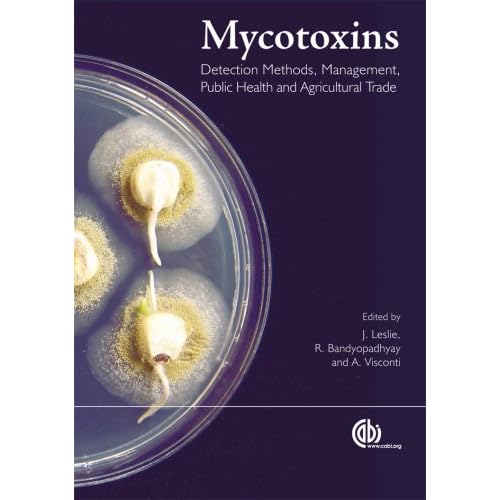 4/6 April 2011 - Cape Town South Africa
4/6 April 2011 - Cape Town South Africa“Mycotoxin reduction – Global solutions"
The MycoRed Africa 2011 Conference will bring together a range of international experts to discuss mycotoxicological issues in general and mycotoxin reduction measures in particular.
The Conference will be held from 4 to 6 April 2011 under the auspices of the International Society for Mycotoxicology.
The academic programme aims to address a wide range of issues concerning mycotoxins, including their production by mycotoxigenic fungi, natural occurrence, their fate during processing from farm to plate, toxicology and regulatory control. Emphasis will be placed on the conference theme, but prominence will be given to the problems in different African environments and their potential solutions.
Besides talks on numerous topics by invited speakers (local and international), there will be opportunity for presentation of original research work, either as oral or poster presentations. Participation of delegates from the African continent will be encouraged and actively promoted.
Delegates are encouraged to use this meeting as a forum to discuss their research findings.The conference is organized by Gordon Shephard from MRC.
25/27 October 2010 - Cairo, Egypt.Mycotoxicological risks in Mediterranean countries: economic impact, prevention, management and control.
This workshop will be focused on the cooperation among Mediterranean Countries, with an overview on the current situation on the occurrence of mycotoxins and toxigenic fungi in Mediterranean Bacin.
Prevention and control of mycotoxins in Mediterranean food and feed chain, as well as Mycotoxins of Public and Animal Health Significance in the Meditteranean will be other relevant themes to be discussed.
This workshop will be focused on the cooperation among Mediterranean Countries, with an overview on the current situation on the occurrence of mycotoxins and toxigenic fungi in Mediterranean Bacin.
Prevention and control of mycotoxins in Mediterranean food and feed chain, as well as Mycotoxins of Public and Animal Health Significance in the Meditteranean will be other relevant themes to be discussed.
2nd of May 2010. Interview with Dr. Angelo Visconti, Institute of Sciences of Food Production (ISPA), National Research Council (CNR) Bari, Italy (Bio Circle working visit).
This EC FP7 project called MycoRed builds significantly on the outcome of several European projects (through most coordinators/partners of FP5 and FP6).
Mycotoxins are dangerous for feed and food chains as they can create contamination in pre- and post-harvest processes. Mycotoxin research is making strong efforts to improve knowledge and reduction of aflatoxins, trichothecenes (deoxynivalenol, nivalenol, T-2 and HT-2 toxins, etc.) , zearalenone, fumonisins and ochratoxin A are very important to handle this problem.
Mycotoxin reduction targets of vital importance have been identified by some international food organizations (e.g. FAO, CIMMYT, EFSA, IITA, SAFE consortium), EU reports and relevant food industry representatives.
Mycotoxins effects

- Aflatoxin B1 is a proven carcinogen for humans. It is immunotoxic and causes stunted growth in children and growth retardation in animals.
- Fusarium toxins, especially fumonisins , are neurotoxic and possible carcinogens, trichothecenes are immunotoxic and zearalenone is estrogenic.
- Ochratoxin A is a nephrotoxin, possibly carcinogenic to humans and associated with Balkan Endemic Nephropathy.
Mycotoxins Detection Methods, Management, Public Health and Agricultural Trade
Edited by J Leslie, Kansas State University, USA, R Bandyopadhyay, International Institute of Tropical Agriculture, Nigeria, A Visconti, Institute of Sciences of Food Production, Italy
Content:
Mycotoxins are produced worldwide by several fungi on a wide range of agricultural commodities and are closely related to human and animal food chains. Examining mycotoxins and their impact from a public health viewpoint, this book provides an overview and introduction to the subject and examines the health, trade and legislation issues involved. Management of mycotoxins is discussed in detail as well as the global problems caused by mycotoxins.
Related:
29-30 April 2010 BIO CIRCLE organised in Rome its 3rd midterm Meeting and above mentioned working visit in Bari. (BIO CIRCLE = Creating a CIRCLE by extending the BIO NCP network to Third Country NIPs)



No comments:
Post a Comment